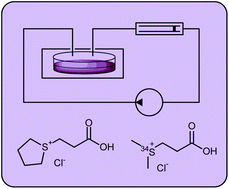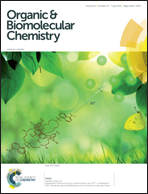Marine bacteria from the Roseobacter clade produce sulfur volatiles via amino acid and dimethylsulfoniopropionate catabolism†
Abstract
Dimethylsulfoniopropionate (DMSP) is a versatile sulfur source for the production of sulfur-containing secondary metabolites by marine bacteria from the Roseobacter clade. 34S-labelled DMSP and cysteine, and several DMSP derivatives with modified S-alkyl groups were synthesised and used in feeding experiments that gave insights into the biosynthesis of sulfur volatiles from these bacteria.


 Please wait while we load your content...
Please wait while we load your content...